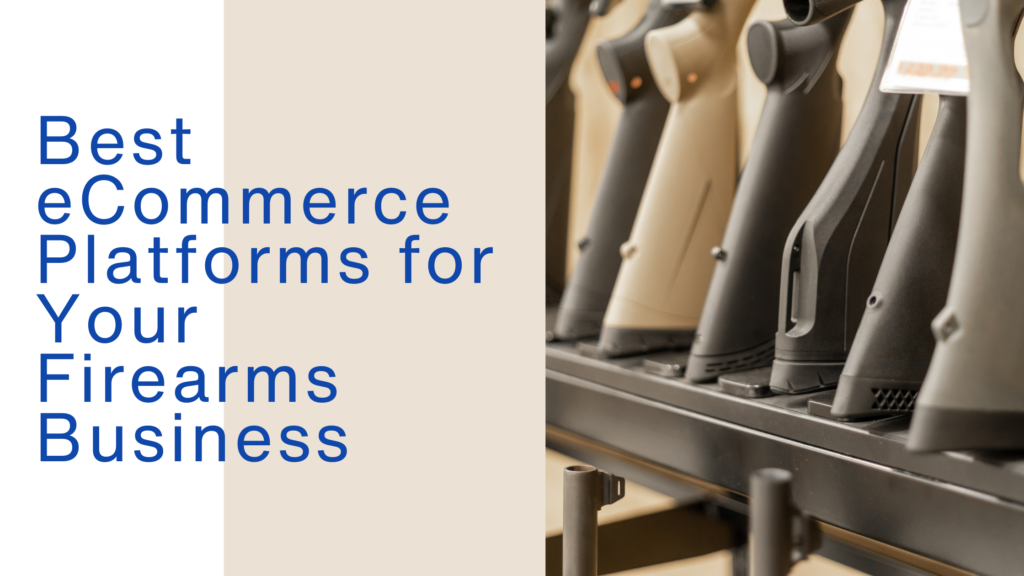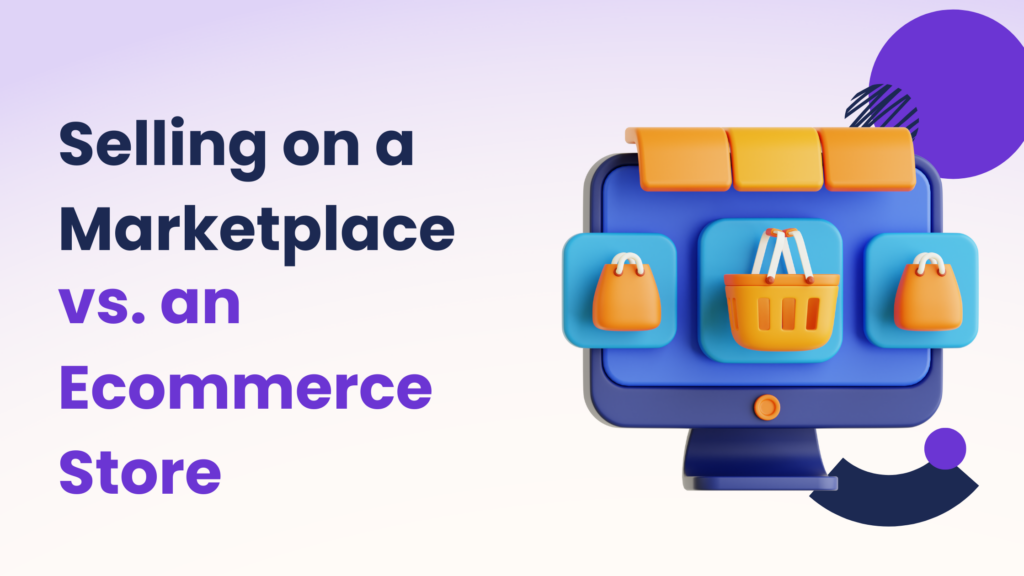Best Ecommerce Platforms for Your Firearms Business
The world of firearms business has seen a significant shift towards ecommerce in recent years as more and more customers seek to purchase firearms and related accessories online. However, with numerous options available in the online market, choosing the best firearm website can be a daunting task. The right ecommerce weapon platform can make a significant difference in the success of an online dropship firearms business as it directly affects the website’s functionality, security, and overall user experience. Moreover, with the increasing competition in the online space, firearms businesses are beginning to adopt strategies similar to those in digital advertising for SaaS, focusing on optimizing their platforms to stand out.
In this blog, we will explore the key factors to consider when selecting an ecommerce platform for firearms businesses, including compliance with legal regulations, payment processing options, security features, customization capabilities, and pricing considerations. By understanding these critical factors, firearms business owners can make an informed decision and select the best ecommerce platform that meets their unique needs and helps them achieve their online business goals.
Types of Ecommerce Platforms for Your Firearms Business
Open Source
Using an open source ecommerce platform for a firearms business can offer unique advantages and challenges that are specific to the industry. Here are some pros and cons to consider:
Pros of Open Source Ecommerce Platforms for Your Firearms Business
- Customization for Regulatory Compliance: The firearms industry is highly regulated, and open source ecommerce platforms can provide the flexibility to customize the online store to comply with various legal regulations, such as age verification, background checks, and shipping restrictions. This allows firearms businesses to ensure they are adhering to all relevant laws and regulations in their specific jurisdiction, which is crucial in the firearms industry.
- Flexibility for Inventory Management: Firearms businesses often deal with complex inventory management due to various types of firearms, accessories, and related products. Open source ecommerce platforms can provide flexibility in managing inventory, including tracking serial numbers, managing stock levels, and handling compliance-related information, which can be critical for firearms businesses.
- Scalability for Ecommerce Growth: Open-source ecommerce platforms are designed to be scalable, which means they can handle large volumes of traffic and transactions. This makes them an ideal choice for firearms businesses that expect to grow quickly or experience fluctuations in demand.
- Third-Party Integrations for Unique Needs: Firearms ecommerce businesses can use open-source platforms to integrate with a wide range of third-party tools and services, such as payment gateways, shipping providers, and marketing automation tools. This can help streamline operations and improve efficiency.
Cons of Open Source Ecommerce Platforms for Your Firearms Business
- Technical Cost, Expertise and Security: Firearms businesses may require specialized technical expertise to set up and maintain open source ecommerce platforms, especially when it comes to security. Firearms transactions involve sensitive information, and ensuring robust security measures, such as SSL encryption, secure payment gateways, and data protection, is critical. This may require additional investment in security measures and skilled developers to properly implement and maintain.
- Limited Support: While open-source platforms often have large communities of developers and users who can provide support, there may not be dedicated support teams available to help businesses with issues that arise. This can make it challenging to get timely help when needed.
- Customization Complexity: While open-source platforms offer a high degree of customization, this can also be a double-edged sword. Firearms businesses may find it challenging to customize the platform to meet their specific needs, or the customization process may be time-consuming and expensive.
- Integration Challenges: Open-source ecommerce platforms may not integrate easily with other software and systems used by firearms businesses, which can make it challenging to create a seamless and efficient workflow. This may require more time, expenses, and expertise, as mentioned above.
SaaS
Using Software-as-a-Service (SaaS) ecommerce platforms for a firearms business can offer several advantages and disadvantages. We’ve outlined some below.
Pros of SaaS Ecommerce Platforms for Your Firearms Business
- Ease of Use and Quick Setup: SaaS ecommerce platforms are typically designed to be user-friendly, with intuitive interfaces and easy setup processes. This can be beneficial for firearms businesses that may not have extensive technical expertise or resources, allowing them to quickly set up and launch their online store without significant technical knowledge or coding skills.
- Managed Infrastructure and Security: SaaS ecommerce platforms are hosted and managed by the service provider, which means businesses do not need to worry about infrastructure maintenance, server updates, and security measures. These platforms often come with robust security features, including SSL encryption, regular backups, and security patches, which can help protect firearms businesses from potential security risks.
- Regular Updates and Support: SaaS ecommerce platforms typically receive regular updates and improvements from the service provider, ensuring that the platform stays up-to-date with the latest features, bug fixes, and security patches. Additionally, SaaS providers usually offer customer support, which can be valuable for firearms businesses that may need assistance with technical issues, compliance concerns, or other challenges.
- Scalability for Growth: SaaS ecommerce platforms are designed to scale, making them suitable for firearms businesses with growth aspirations. These platforms can handle high volumes of transactions, support multiple product types, and offer features such as inventory management or firearms inventory software, order tracking, and payment processing, which can be essential for growing firearms businesses.
Cons of SaaS Ecommerce Platforms for Your Firearms Business
- Limited Customization: SaaS ecommerce platforms may have limitations in customization compared to open source platforms. Firearms businesses may have unique requirements for compliance, branding, or other specific needs that may not be fully accommodated by the pre-built templates or features of SaaS platforms. This may require businesses to compromise on certain customization options or invest in additional development work.
- Cost Considerations: While SaaS ecommerce platforms may offer lower upfront costs compared to custom-built solutions, they often involve ongoing subscription fees and transaction fees based on the volume of sales. Firearms businesses with high transaction volumes may incur significant costs over time, which need to be carefully considered in the overall budgeting and financial planning.
- Dependency on Service Provider: Firearms businesses using SaaS ecommerce platforms are dependent on the service provider for hosting, maintenance, and updates. If the service provider experiences downtime, security breaches, or other technical issues, it may impact the functioning of the online store. Additionally, firearms businesses may face challenges if they decide to switch to a different platform or migrate their data, as data portability can be a complex process.
- Compliance and Legal Considerations: Firearms businesses need to ensure that the chosen SaaS ecommerce platform complies with all relevant laws and regulations in the firearms industry, including age verification, background checks, shipping restrictions, and other compliance requirements. It is essential to thoroughly review the terms of service, privacy policies, and legal agreements of the SaaS provider to ensure compliance and mitigate potential legal risks.
Selecting the Best Firearm Website for Your Firearms Business: The Good and Bad
WooCommerce
WooCommerce is a popular ecommerce platform due to its affordability, flexibility, and ease of use. However, it has some limitations when it comes to using it for a firearms business.
WooCommerce does not offer specific features for firearms sales compliance, and businesses will need to add third-party plugins or custom code to ensure compliance, which can add additional costs and complexity to the platform. Additionally, WooCommerce may not be the best option for businesses with complex product catalogs or extensive inventory management needs, and it may not offer advanced security measures required by firearms businesses.
On the positive side, WooCommerce offers customization options, allowing businesses to create a unique and branded online store. It also has a large community of developers and users, providing access to many plugins and integrations to extend its functionality. However, firearms businesses should carefully evaluate their needs and consider other ecommerce platforms that may better meet their requirements for compliance, scalability, and security.
Shopify
Shopify is not an ideal ecommerce platform for firearms businesses due to its strict policies against the sale of firearms and related products. Shopify does not allow the sale of firearms, ammunition, or any related products, including parts and accessories, on its platform. While some firearms businesses may attempt to sell on Shopify using deceptive tactics, such as listing items under false categories, Shopify actively monitors for these types of activities and can shut down accounts that violate its policies. Therefore, firearms businesses should consider other ecommerce weapon platforms that are more suitable and allow the sale of firearms and related products.
BigCommerce
BigCommerce is a leading ecommerce platform that offers a range of features that make it a great choice for firearms businesses. One of the key benefits of BigCommerce is its compliance with firearms sales regulations. The platform offers age verification and other compliance features, ensuring that businesses can operate legally and securely. BigCommerce also integrates with a range of firearms-specific software and services, such as background check providers, shipping carriers, and payment gateways.
Another benefit of BigCommerce is its scalability. The platform can handle high volumes of traffic and transactions, making it a good option for growing firearms businesses. Additionally, BigCommerce offers extensive inventory management features, allowing businesses to easily manage complex product catalogs and variations. The platform also provides advanced security measures, including SSL encryption and PCI compliance, ensuring that businesses can protect sensitive information and transactions.
Adobe Commerce/Magento
One of the key advantages of using open source Adobe Commerce/Magento for firearms businesses is its flexibility and customization options. The platform offers a range of features and integrations that can be tailored to meet the specific needs of firearms businesses. This includes compliance with firearms sales regulations, age verification, and shipping restrictions. Additionally, Adobe Commerce/Magento offers advanced inventory management features that can help businesses manage complex product catalogs and variations. The platform can also handle large volumes of traffic and transactions, making it a good option for businesses with growing customer bases.
However, one of the main drawbacks is the complexity of the platform. While Adobe Commerce/Magento offers a high level of customization and flexibility, this can also make it difficult to use and maintain, particularly for businesses with limited technical expertise. Additionally, the platform can be costly, particularly for businesses with large product catalogs or extensive customization requirements. While Adobe Commerce/Magento offers advanced security features, firearms businesses will still need to invest in additional security measures to ensure the protection of sensitive information and transactions.
GunBroker
GunBroker is the best firearm website where businesses can list their inventory for sale to potential buyers. We can also call it a weapon platform as it is integrated specifically with firearms. One advantage of using GunBroker is its large user base, which can increase the visibility of a firearm business’s inventory and potentially lead to more sales. Additionally, GunBroker offers various tools and features for sellers to manage their listings, track their sales, and communicate with buyers. GunBroker specifically offers firearms inventory software which is tailored for the firearms industry. These tools can save time and streamline the selling process for businesses.
However, there are also some potential disadvantages to using GunBroker. For one, the site charges fees for each listing and sale, which can add up over time and cut into a business’s profits. Additionally, since GunBroker is an online marketplace, businesses may face more competition from other sellers, potentially leading to lower prices and margins. Finally, like any online platform, there is a risk of fraud or scams, which can be harmful to a business’s reputation and finances if not properly managed. Therefore, businesses should carefully weigh the pros and cons before deciding to sell on GunBroker or any other online marketplace for their firearms business.
Industry-Specific Ecommerce Weapon Platforms for Firearms Businesses
While firearms-specific ecommerce platforms may offer certain advantages, such as compliance with firearms sales regulations and specialized features, they may not be the best solution for firearms businesses in the long term. One of the main drawbacks of these weapon platforms is that they may not be able to keep up with technological advancements and changes in the ecommerce market. This can limit the ability of firearms businesses to compete and adapt to evolving customer needs and preferences.
In addition, firearms-specific ecommerce platforms may be less flexible and customizable than more general ecommerce platforms. This can make it difficult for businesses to tailor their online stores to meet the specific needs of their customers and operations. While firearms-specific platforms may offer certain advantages in terms of compliance and specialized features, businesses should carefully consider their long-term needs and goals before committing to a platform that may not be able to keep up with the rapidly evolving ecommerce landscape.
Wrapping Up
Choosing the right ecommerce platform for a firearms business requires careful consideration of the advantages and disadvantages of both open source and SaaS platforms.
Open source ecommerce platforms offer customization and flexibility for inventory management and regulatory compliance, but may require specialized technical expertise and additional investment in security measures. On the other hand, SaaS platforms provide ease of use, managed infrastructure and security, and regular updates and support, but may have limitations in customization and firearm regulations.
While BigCommerce is the stand-out choice in terms of an ideal ecommerce platform for firearms businesses, they ultimately should weigh their specific needs and priorities against the features and costs of each platform to make the best choice for their unique firearms business.








